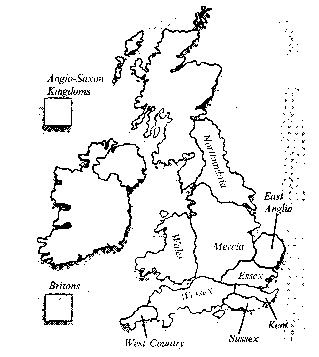
9
Celts fled West taking with them their culture, language and Christianity.
The Anglo-Saxon England was a network of small kingdoms.
The seventh century saw the establishment of seven kingdoms: Essex (East Saxons), Sussex (South
Saxons), Wessex (West Saxons), East Anglia (East Angles), Kent, Mersia and Northumbria, and the
largest three of them – Northumbria, Mercia and Wessex – dominated the country at different times.
The Anglo-Saxon kings were elected by the members of the Council of Chieftains (the Witan) (see Chart I, p.
9) and they ruled with the advice of the councilors, the great men of the kingdom. In time it became the custom
to elect a member of the royal family, and the power of the king grew parallel to the size and the strength of his
kingdom. In return for the support of his subjects,– who gave him free labour and military service, paid taxes
and duties – the King gave them his protection and granted lands.
By the end of the eighth century the British Isles were subjected to one more invasion by nonChristian
people from Scandinavia.
...But the Romans left
And the Danes blew in...
That's where your history book begins...
R. Kipling

